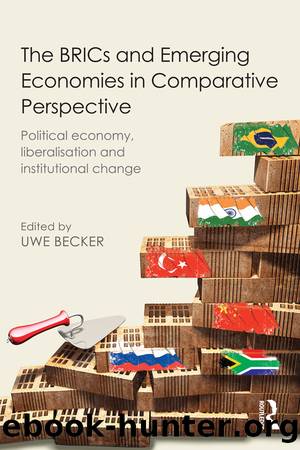The BRICs and Emerging Economies in Comparative Perspective: Political Economy, Liberalization and Institutional Change by Uwe Becker

Author:Uwe Becker [Becker, Uwe]
Language: eng
Format: epub
Tags: Political Science, General
ISBN: 9780415843508
Google: Ql1smwEACAAJ
Amazon: B00G6N3390
Barnesnoble: B00G6N3390
Goodreads: 19821401
Publisher: Routledge
Published: 2013-01-15T06:47:41+00:00
5.4 Continuity in Russian stateâbusiness relations
The legacy of patrimonialism
Entrenched patrimonialism has been traditionally characteristic of the Russian political environment. In a patrimonial system, the state does not pursue the public good but operates in the interest of clans and informal networks that âprivatiseâ the state institutions for personal enrichment. This implies a system of government administration in which state officials are responsible to the top political leadership but at the same time are given wide leeway and treat their jobs as income-generating property (Brinkerhoff and Goldsmith 2002: 40).
In Russia, a system of personalised exchange relationships and clientelist politics has flourished since tsarism, blurring the distinction between politics and the economy. The Soviet patrimonial system was marked by hierarchical chains of personal dependence between party leaders and their underlings, who extracted economic rents from the state property under their control (Jensen 2001: 34). Since the old Soviet elite largely remained in control of the state apparatus after the collapse of communism, Russia has inherited the patrimonial character of the Soviet public administration.
At the heart of Russian patrimonialism lies the tradition of entrenched paternalism, rooted in social passivity, the legacy of forced labour and the ingrained respect of authority. For instance, the Russian workers prefer to rely on informal, paternalistic relations with the enterprise managers rather than join collective action to defend their interests (see the next section). By the same token, having âmade friendsâ with the authorities or having agreed on a kick-back scheme, businessmen are eager to retain informal contacts with the bureaucrats instead of following the official rules. In a similar vein, the Russian public, accustomed to being patronised by the âfather stateâ and at the same time disbelieving that anything could be changed âup thereâ, seldom attempts to contest the official rules of the game but rather seeks unofficial ways to circumvent them. This has resulted in particularism and the pursuit of private gain as the guiding social principles in Russia, as opposed to universalism and the pursuit of the common good.
The dominance of particularism has led to the society-wide spread of informal relations, unwritten rules and ad hoc arrangements that count more than laws and written contracts. Dogovoritsa â a Russian verb that refers to all kinds of âprivate solutionsâ negotiated between the bureaucrats, businessmen and workers â affects virtually every aspect of the Russian political economy and, most importantly, is regarded as ânormalâ by large parts of the Russian public. According to a recent poll, virtually nobody in Russia believes that all court decisions are made in accordance with the law (OECD 2011d: 78). All in all, the persistence of paternalistic attitudes and the dominance of informal ways of interaction sustain and reproduce Russian patrimonialism. One of its most salient manifestations is the enduring corruption.
Download
This site does not store any files on its server. We only index and link to content provided by other sites. Please contact the content providers to delete copyright contents if any and email us, we'll remove relevant links or contents immediately.
International Integration of the Brazilian Economy by Elias C. Grivoyannis(109782)
The Radium Girls by Kate Moore(12017)
Turbulence by E. J. Noyes(8040)
Nudge - Improving Decisions about Health, Wealth, and Happiness by Thaler Sunstein(7690)
The Black Swan by Nassim Nicholas Taleb(7106)
Rich Dad Poor Dad by Robert T. Kiyosaki(6607)
Pioneering Portfolio Management by David F. Swensen(6288)
Man-made Catastrophes and Risk Information Concealment by Dmitry Chernov & Didier Sornette(6004)
Zero to One by Peter Thiel(5786)
Secrecy World by Jake Bernstein(4740)
Millionaire: The Philanderer, Gambler, and Duelist Who Invented Modern Finance by Janet Gleeson(4465)
The Age of Surveillance Capitalism by Shoshana Zuboff(4274)
Skin in the Game by Nassim Nicholas Taleb(4236)
The Money Culture by Michael Lewis(4197)
Bullshit Jobs by David Graeber(4179)
Skin in the Game: Hidden Asymmetries in Daily Life by Nassim Nicholas Taleb(3987)
The Dhandho Investor by Mohnish Pabrai(3758)
The Wisdom of Finance by Mihir Desai(3729)
Blockchain Basics by Daniel Drescher(3574)
